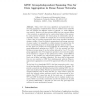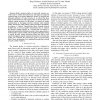625 search results - page 109 / 125 » Approximating Travel Times Using Opportunistic Networking |
124
click to vote
INFOCOM
2010
IEEE
15 years 10 days ago
2010
IEEE
—In Multi-User MIMO networks, receivers decode multiple concurrent signals using Successive Interference Cancellation (SIC). With SIC a weak target signal can be deciphered in th...
136
click to vote
INFOCOM
2010
IEEE
14 years 11 months ago
2010
IEEE
Multi-gigabit outdoor mesh networks operating in the unlicensed 60 GHz "millimeter (mm) wave" band, offer the possibility of a quickly deployable broadband extension of t...
123
click to vote
SIGECOM
2009
ACM
15 years 8 months ago
2009
ACM
The Target Set Selection problem proposed by Kempe, Kleinberg, and Tardos, gives a nice clean combinatorial formulation for many problems arising in economy, sociology, and medicin...
130
click to vote
DCOSS
2006
Springer
15 years 5 months ago
2006
Springer
Abstract. Today, there exist many algorithms and protocols for constructing agregation or dissemination trees for wireless sensor networks that are optimal (for different notions o...
119
click to vote
INFOCOM
2008
IEEE
15 years 8 months ago
2008
IEEE
Abstract—Radio channel quality of real-world wireless networks tends to exhibit both short-term and long-term temporal variations that are in general difficult to model. To maxi...


